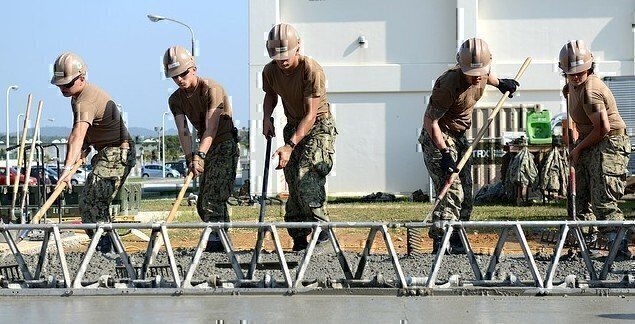SPONSORED*
Do you crave accomplishment? Carrying out missions, relaying orders and landing supervisory roles are strengths cultivated in the military and can translate in many areas of work: in this case, outside the cubicle. Here’s how to get a job in construction management.
In a past Hot Jobs 2015 article, construction manager Fausto DiOdoardo of Lehigh Valley, Pa. — who has 36 years of experience in the field — explains how accomplishing tasks with efficiency and verbal communication go hand-in-hand in procuring a successful career in construction, and that going to college may in fact not be the most efficient path for learning the truths of the trade, or even managing them. If you need help with your resume, make sure you read the military to civilian cover letter and 10 ways to civilianize your resume.
How long does it take to make the transition from construction worker to a supervisor?
FD: It depends on your situation – if you’re in a large or small company. A supervisor in a larger company is really just a coordinator: making sure the supplies are there and everyone is working efficiently. In a smaller company you may have someone who is more hands-on. In either company, though, if you are ambitious and have a good perspective, it shouldn’t be long until that potential is recognized. Someone who is on time, aggressive and picks up on things quickly – gaining a general knowledge of all the things involved in construction – speaks volumes. Knowledge is key, and, of course, experience. In order to be a manager, or start your own company as an independent contractor, it may take one to three years, but there is no set time limit. The financial part of starting your own business is important to take into consideration if that is one’s goal.
What are the best qualities in a construction employee?
FD: Knowledge – a quick-learner. Being able to pick up on the tricks of the trade; one who is reliable and shows up every day and interacts well with other employees.
… And as a construction manager?
FD: Communication skills; being able to get the job done. No obstacles, just getting the job done.
According to statistics from the 2013-2014 Occupational Outlook Handbook, employers are increasingly looking for construction manager candidates who hold bachelor’s degrees in construction science, construction, architecture or civil engineering. Have you picked up on this trend?
FD: Not much directly on the job sites I’ve managed. My experiences with people with these degrees are normally permit and zoning office employees and inspectors. In construction, you are always dealing with inspectors and zoning offices, you can’t start any job without those people involved. My opinion is that getting a college education for construction management is not always efficient because it often lacks the “reality” of the work. Some things must be learned on the site, and each company has their own style of operating, too.
Do you have any other ‘inside’ tips for prospective individuals looking to become a construction manager?
FD: In my opinion, construction is good for individuals who like hands-on physical work — even in a managerial role. I still look for physical work because it offers me a true sense of accomplishment. Communicating effectively is also critical — the best managers are able to macro-manage.
—
As DiOdoardo points out, the majority of workers in the field of construction management do not hold college degrees. Realistically, there is no better place to learn construction skills than on the job site. Ambition, reliability and communication skills are highly valued in the field — and recognized — and can propel a worker into a management position in about the same (if not less) time than obtaining a college degree.
Alternatively, gaining practical knowledge about construction outside the job site without spending too much time in the classroom can also be obtained through the Construction Management Association of America, which offers several construction certifications, including a Professional Construction Management Course™. All told, additional forms of gaining knowledge can provide a foundation to further build on and carry in an upper hand, but aren’t the end-all-be-all to becoming a successful construction manager.
READ NEXT: 6 Outdoor Jobs for Vets










